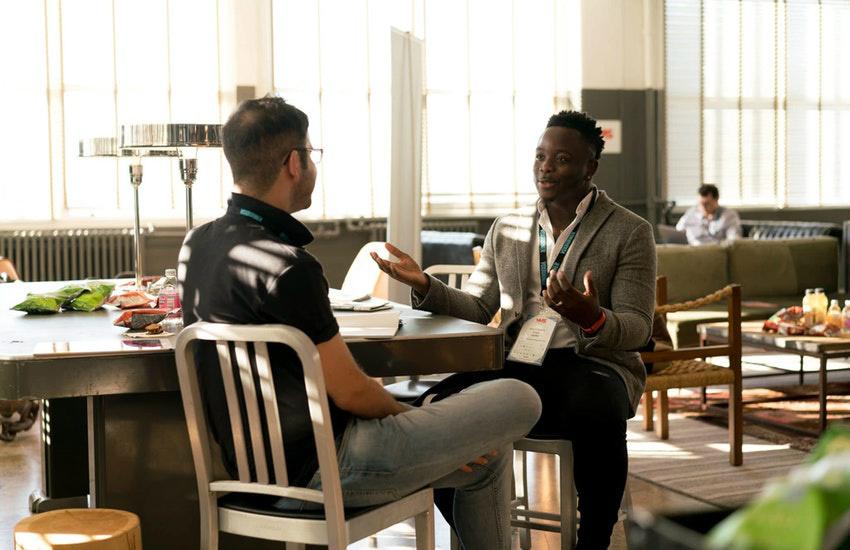How to Answer the “How Would Someone Else Describe You?” Interview Question
Published: Jun 19, 2019

You know that the first thing an interviewer is going to ask you is, “Tell me about yourself.” That’s just what interviewers do. But at some point, many interviewers will flip the question: “How would your friends/coworkers/boss describe you?” And that’s an altogether different question. You know what you’re like, but how do other people perceive you? Ultimately, their takeaways matter quite a bit. So how do you answer this interview question? I’m going to break it down by potential describer and see what your interviewer is really asking.
Your Friends
I love my friends dearly, but they are not the people that I would ask to describe me to a potential future employer. The prevailing opinion would probably be, “She’s a loudmouth who watches too much TV and uses all caps in texts a lot.” Accurate, but not the professional identity I’m attempting to cultivate. I can imagine the same goes for a lot of friends’ relationships—so why are hiring managers asking? Because they want to know what you’re like “in real life.” They want to see if you’ll be a cultural fit for the company—if the office is a pretty competitive place, they might not be looking for someone whose friends would describe them as “chill.” Likewise, if the office is laid back, they may not be looking for a “gunner.”
In this situation, I would advise choosing qualities of yourself that are universally likeable—something that would make spending an eight-hour day with you seem like a good idea. There’s a 99 percent chance you’re a very nice person who’s a pleasure to be around, so don’t get modest for this one. I also usually end it with a joke, since friends always know more about you then you’d normally tell an employer, and your interviewer knows this. As an example, my go-to response is usually, “They’d probably describe me as straightforward and flexible, with a good sense of humor. They’d also probably warn you that I’m overly competitive at pub quiz.” A joke like that can ease any tension in the room and provide another channel of conversation with your interviewer.
Your Coworkers
The person you are at work and the person you are with friends is likely not exactly the same person. I’m not saying that we all live secret double lives, but some compartmentalization between work and home is natural. When an interviewer asks what your coworkers would say about you, they’re really asking two things: What are you like at work, and what are you like to work with? This question is a bit different than what your friends would think because it invites you to share specific situations. No one needs specific stories about your personal life, but interviewers definitely want examples of your work style.
In this situation, pick one to three traits to cover, and have examples to back them up. For example, “My coworkers would probably describe me as very organized—I’m usually the one people check with to confirm when meetings and deadlines are because they know that my calendar is always up to date.” Or, “My coworkers would call me a team player—I’m always happy to help out if someone’s feeling under the gun, even if it’s not something normally in my job description.” Answers like these give your interviewer a sense of how you’ll fit with your potential new team, and example situations demonstrate the concrete value you’ll bring with you if you’re hired.
Your Boss
The way that your boss would describe you is probably different than your coworkers would—the two of you have a different working relationship. And the way that people interact with their bosses can be very revealing—what you talk about when you discuss your boss is very important, so this is the question that holds the biggest potential for risk.
First things first, you should never, ever, ever bad-mouth your boss. A sarcastic answer like, “He’d say I’m a good cog in the machine, if he remembered my name,” is a HUGE no-no. I don’t care how bad your boss is, you don’t say that: a) it’s bad form and b) word gets around—for all you know, your interviewer and your boss are golf buds. Even if they’re not, no one wants to work with someone with a negative attitude—answer this question like that, and you will not be getting called back.
I sincerely hope your boss is a wonderful person and you have nothing but nice things to say about them, because this question is definitely a chance to show that you appreciate them. You don’t need to gush, but you can certainly pay a compliment. For example, “My boss is great—she’s really taken the time to help me understand the various aspects of SEO and social media. So she’d probably tell you that I’m intellectually curious and invested in growing my knowledge base.” One thing you could also do is mention a positive performance review you received: “In my last performance review, my boss said that my contributions to our latest social media campaign were invaluable; I really appreciate how she always acknowledges my hard work.” Answers like these show that you have a positive attitude, that you have a good relationship with your colleagues, and that you engage in your field in a meaningful way.
Other people’s perceptions of you are, for better or worse, very important in a job search. That’s why interviewers ask questions like these. They want to know what you think of yourself and what you believe you’re putting out there into the world. So be positive, stay confident, and don’t let a question like this one rattle you!
